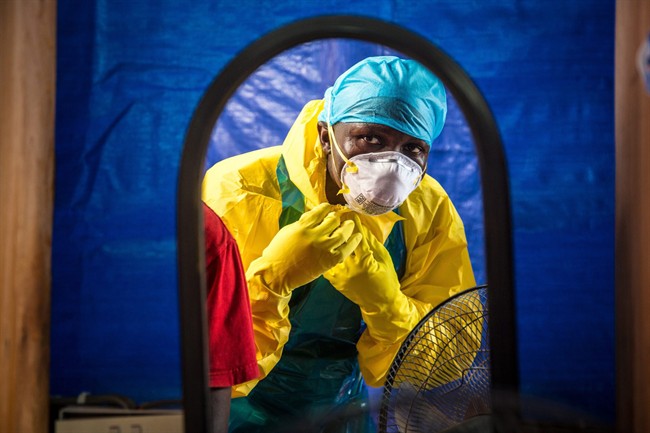TORONTO – Men who have survived the Ebola virus need to abstain from sex for three months to reduce the risk of transmission, the World Health Organization is warning.

The deadly virus that health officials are trying to tame in West Africa could stay in their semen for up to 82 days – longer than in blood or other bodily fluids.
“Men who have recovered from Ebola virus disease should be aware that seminal fluid may be infectious for as long as three months after the onset of symptoms,” WHO said in a weekend statement.
“Because of the potential to transmit the virus sexually during this time, they should maintain good personal hygiene after masturbation, and either abstain from sex (including oral sex)…or use condoms if abstinence is not possible,” the statement advises.
READ MORE: How does Ebola spread? 5 things you need to know
Keep in mind, sexual transmission of Ebola has not been documented. But in four studies of about 43 patients, three men who recovered from Ebola reportedly shed live virus in their semen 40 days after onset of symptoms, 61 days and even 82 days later.
WHO says that it’s unclear if semen that tests positive for Ebola is infectious.
Ebola can only be spread to others after symptoms begin.
“You can’t share it with anybody. It happens only when it comes out through bodily fluids,” according to Jason Tetro, a Canadian microbiologist and author.
Ebola grows within your cells, multiplying until you build up a high level of the virus. That’s why it takes time to appear in bodily fluids.
- Naloxone-resistant street drug linked to 9 deaths in Eastern Canada seized in Alberta
- Buzz kill? Gen Z less interested in coffee than older Canadians, survey shows
- ‘She gets to be 10’: Ontario child’s heart donated to girl the same age
- Canada updating sperm donor screening criteria for men who have sex with men
READ MORE: Canada prepping for potential Ebola cases
“Even though the virus is growing within the body, during that incubation period there isn’t sufficient amount of virus to transmit disease to others until the illness is apparent,” Dr. Joel Kettner explained.
The virus is passed on via bodily fluids
Once your symptoms kick in – the fever, the nausea and stomach pain, for example – you’re contagious.
“Bodily fluids” refers to blood, vomit, feces, urine, spit, sweat, semen and even tears.
Some bodily fluids have higher counts of the disease than others. Doctors say that the disease is hard to transmit because you have to be in “very close contact” with an infected person and his or her fluids. It’s not airborne like, say, the seasonal flu or the chicken pox, which are both highly contagious.
It’s not as simple as touching a door knob with a sick patient’s germs, Kettner said.
READ MORE: How health officials are responding to the Ebola outbreak globally
If you have a break in the skin – a cut, scratch or blister – the virus can get into your bloodstream by getting through the barrier the skin provides. It can also enter through the lining of the eye, nasal passages or the mouth – it’s here that the virus can get absorbed easier than through the skin.
It can also be transmitted via sexual contact, objects (such as needles) contaminated with the virus or through the blood or fluids of infected animals and their meat.
carmen.chai@globalnews.ca
Follow @Carmen_Chai


Comments